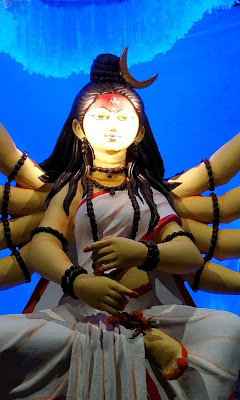The Rituals Of Durga Puja - Maha Saptami
 |
| Maa Durga |
Yesterday
we have talked about the rituals of Maha Sasthi of Durga Puja. Today is the
seventh day of Durga Puja. It is called Maha Saptami. Various rituals are also
performed on this day.
The main ritual of this day is Kola Bou Snan (bathing of the banana plant). In the early morning the day starts by bathing the banana plant in the holy water.
 |
| Kola Bou Snan |
The Banana plantain with another eight plants
is tied with the twigs of white Aparajita plant (Butterfly Pea). Then it is
bathed in the holy water. In Kolkata it is performed in the Ganga. Then a traditional Bengali saree is draped on it.
If you visit any Durga puja Pandal, you will see a banana plant draped in red white saree placed by the side of Lord Ganesha. As it looks like a new bride, it is called Kola Bou (kola means banana and Bou means married woman). Bengalis believed it to be the wife of Lord Ganesha. But that’s not the truth. This is called Nabapatrika. The meaning of Nabapatrika is nine leaves. This Nabapatrika symbolizes Goddess Durga.
 |
| Rituals Of Nabapatrika |
According
to the rituals after bathing the Nabapatrika, it is brought to the puja pandal
and placed on the right side of Goddess Durga. The Main Puja starts with this
ritual. The nxt few days this Nabapatrika is worshipped with Goddess Durga.
 |
| Nine Plants Of Nabapatrika |
The
nine plants of the Nabapatrika represent nine different forms of Maa Durga.
Banana plant represents Goddess Brahmani
Turmeric
plant represents Goddess Durga
Jayanti
plant represent Goddess Kartiki
Wood Apple
tree represents Goddess Shiva
Pomegranate
plant represent Goddess Raktadantika
Ashoka tree
represents Goddess Sokrahita
Arum plant
represents Goddess Chamunda
Rice pant
represents Goddess Lakshmi
Cola cassia
Plant represents Goddess Kalika
But the interesting fact is that among the nine Goddesses only Goddess Chamunda is worshipped. Rituals do not allow to worship the rest eight goddesses.
In ancient times Nabapatrika was worshipped by the farmers for a good harvest. But after Durga Puja gained the popularity, people started to perform this ritual with Durga Puja.



Comments
Post a Comment